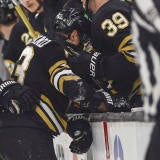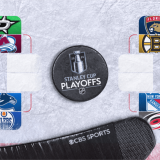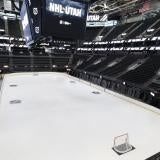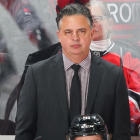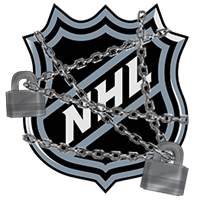 It's easy to get lost in the semantics of labor negotiations. There are terms like HRR and escrow and numerous other seemingly trite messages debating the parsed meaning of words in negotiations.
It's easy to get lost in the semantics of labor negotiations. There are terms like HRR and escrow and numerous other seemingly trite messages debating the parsed meaning of words in negotiations.
Of all the words you hear, the one that might be biggest of all is one that you don't hear much about: trust. It takes time to come to trust your foe in negotiations, time to get an understanding of what they want to do and how they're going to do it. In other words, it takes time to build rapport.
That can help explain why we are stuck at this impasse in the NHL as the lockout lingers on. The main figures in this saga, Gary Bettman and Donald Fehr, haven't been at this for long. Well they have, just not against each other.
Richard Sheehan. a University of Notre Dame Finance Professor and author of Keeping Score: The Economics of Big-Time Sports, says that lack of history together is directly contributing to the current stalemate.
"At this point, both sides are likely trying to determine their opponent’s primary objectives, the extent to which they may be willing to trade one objective for another, the potential to identify win-win solutions, the strength of the other's resolve and willingness to fight, and any potentially exploitable weaknesses or splits in the other side’s membership," Sheehan said. "Perhaps most importantly, they are learning the extent to which they can trust the other side.
"If you have two sides sitting down who have never negotiated before, have no bargaining history whatsoever, then it's going to take a lot longer. Normally there is a history, good or bad. I would say you are starting at closer to the wrong end of the spectrum than the good end of the spectrum."
With that in mind, it does make it a little more depressing to think back at how long it took for negotiations to actually start. The NHL had been saying for a long time that it was ready to start talking but the NHLPA wasn't ready. That's part of the drawback to having a new union head; Fehr needed time to meet with his constituents and get a lay of the land. If they could have started talking sooner than after this past season, maybe they would be through the "getting to know you" section of the show.
The good news is that both Bettman and Fehr have been here before. Then again, maybe that's the bad news. We're talking about two of the best negotiators we've ever seen in sports.
"If you look at their track records, you'd be hard-pressed to find somebody on the owners' side who has been more successful and someone on the union side that's currently active that has been more successful," Sheehan said.
In Bettman's case, you have a guy who taken the NHL into a land of record revenues and got the owners exactly what they wanted in the last lockout: a salary cap. In the case of Fehr, he wastes no time in reminding people of the labor peace that he helped bring to baseball, which has gone almost 20 years without any sort of labor stoppage.
Does the fact that this isn't either guy's first rodeo help or hurt to get a resolution to this lockout in the near future?
"It can cut either way," Sheehan said. "If you want, you can phrase it in terms of cementing their legacy. In terms of Fehr's reputation, it stems from baseball. And if he were able to repeat what he did in baseball with the NHL, it would truly push up among the all-stars there. At the same time, Bettman isn't going to be the commissioner forever. But the last time, he had the biggest win ever I think for the owners, albeit at a very sizeable cost. You can look at it that way and say this is going to be an ugly round of negotiations. At the same time, they're both professional and they both know how the game works."
| NHL Lockout | ||
|
||
| More NHL coverage | ||
"Maybe the critical question is, what is the degree of latitude or flexibility on either side? Maybe the owners are going to take the hard-line stance they took last time and say, 'We're just not going to take anything less than 43 percent of overall revenue.' Then I think you might be able to write the season off right now. If they take the perspective that they're willing to listen and will ask you to come down to 43 but maybe settle for 50, then you can get a settlement I think fairly quickly."
Considering the NHL has brought offers to the table that are closer to giving the players 50 percent of the hockey-related revenue than its original offer at 43 percent, there does seem to be some flexibility there. The general assumption by many has been that we'll eventually end up with a split right around 50/50 and the sooner everybody realizes that, the sooner we will have hockey back.
The trick for both sides is to get the other to believe the compromise that they want is the right one. When you have two strong-headed stalwarts across from each other at the table, that's no easy task, which is a source of much of the pessimism toward seeing a deal reached soon.
How do you go about getting what you want in negotiations such as these? The same way a team tries to score in a hockey game: Find the opponent's weakness and attack it. In negotiations such as these, that's best done by finding the crack and wiggling your way in.
"Fehr is a pro and that's what he was successful at doing in baseball, and I'd expect the same strategy here," Sheehan said. "At the same time, Bettman is a pro, too, and was very successful in opening up those cracks last time because it went on so long. There's no question, I think, the owners in particular have a lot of money on the table and don't want to lose that with another lockout. That suggests this time the split is more likely on the owners' side than the players' side."
If it comes down to resolve, it's tough to see them getting anywhere. The union is much stronger this time around under Fehr's leadership, and the owners always seem to remain strong. After all, they're the billionaires in the "millionaires vs. billionaires" equation.
That might explain why the sides met for three days this past weekend and hardly discussed the economics of a new CBA. Instead, they were discussing some of the other elements that go into the CBA. The hope is that one or two agreements on smaller things would lead to three or four agreements on bigger items.
"I think it's a time to build bridges and see if they can work together," Sheehan explained. "I think it's clear that overall percentage is going to be the 400-pound gorilla. And the extent to which you can get the little things out of the way quickly, then you can go back and really negotiate over that particular item."
Sounds great, except for this one little issue:
"At the same time, the potential flaw in that argument is that if you take care of all the little issues, do you have any bargaining chips left out there? Are you willing to give in on drug testing to not lower the percentage from 51 down to 50 or something like that? Those can disappear."
That's certainly something to consider. Both sides lose leverage in the HRR talks by giving up bits and pieces before settling the main piece of the pie. If they can offer to say OK to the Olympics for an extra percentage point, then maybe the stalemate gets even tougher to settle.
Perhaps it's more comforting to hear this is how negotiations go and soon enough we'll see some ground being gained. Everybody knows things have going pretty well for the NHL recently, and they can't afford to lose any momentum with another lockout. The fans don't seem as willing to forgive and forget this time around. It's always a lot more than just showing up and talking; negotiations are more complex and strategic than that.
At the same time, there is no reinventing the wheel necessary here. That would seem to indicate the season shouldn't be in jeopardy once again. Hopefully, all the parties will soon be on the same page and a deal will be reached sometime soon after. As always, it will require some compromise and soon those compromising spots can be spotted.
For more hockey news, rumors and analysis, follow @EyeOnHockey and @StubitsCBS on Twitter and like us on Facebook.








